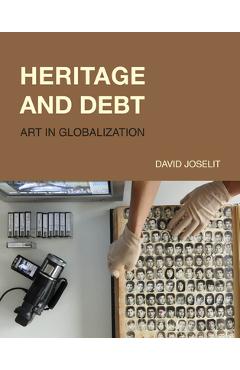Heritage and Debt: Art in Globalization - David Joselit

Detalii Heritage and Debt: Art in
Produs actualizat în urmă cu 2 luni
Descriere YEO:
Descriere magazin:
How global contemporary art reanimates the past as a resource for the present, combating modern art\'s legacy of Eurocentrism. If European modernism was premised on the new--on surpassing the past, often by assigning it to the traditional societies of the Global South--global contemporary art reanimates the past as a resource for the present. In this account of what globalization means for contemporary art, David Joselit argues that the creative use of tradition by artists from around the world serves as a means of combatting modern art\'s legacy of Eurocentrism. Modernism claimed to live in the future and relegated the rest of the world to the past. Global contemporary art shatters this myth by reactivating various forms of heritage--from literati ink painting in China to Aboriginal painting in Australia--in order to propose new and different futures. Joselit analyzes not only how heritage becomes contemporary through the practice of individual artists but also how a cultural infrastructure of museums, biennials, and art fairs worldwide has emerged as a means of generating economic value, attracting capital and tourist dollars. Joselit traces three distinct forms of modernism that developed outside the West, in opposition to Euro-American modernism: postcolonial, socialist realism, and the underground. He argues that these modern genealogies are synchronized with one another and with Western modernism to produce global contemporary art. Joselit discusses curation and what he terms the curatorial episteme, which, through its acts of framing or curating, can become a means of recalibrating hierarchies of knowledge--and can contribute to the dual projects of decolonization and deimperialization.

Heritage and Debt: Art in - Disponibil la libris.ro
Pe YEO găsești Heritage and Debt: Art in de la David Joselit, în categoria Art.
Indiferent de nevoile tale, Heritage and Debt: Art in Globalization - David Joselit din categoria Art îți poate aduce un echilibru perfect între calitate și preț, cu avantaje practice și moderne.
Preț: 220.32 Lei
Caracteristicile produsului Heritage and Debt: Art in
Comandă Heritage and Debt: Art in Online, Simplu și Rapid
Prin intermediul platformei YEO, poți comanda Heritage and Debt: Art in de la libris.ro rapid și în siguranță. Bucură-te de o experiență de cumpărături online optimizată și descoperă cele mai bune oferte actualizate constant.
Descriere magazin:
How global contemporary art reanimates the past as a resource for the present, combating modern art\'s legacy of Eurocentrism. If European modernism was premised on the new--on surpassing the past, often by assigning it to the traditional societies of the Global South--global contemporary art reanimates the past as a resource for the present. In this account of what globalization means for contemporary art, David Joselit argues that the creative use of tradition by artists from around the world serves as a means of combatting modern art\'s legacy of Eurocentrism. Modernism claimed to live in the future and relegated the rest of the world to the past. Global contemporary art shatters this myth by reactivating various forms of heritage--from literati ink painting in China to Aboriginal painting in Australia--in order to propose new and different futures. Joselit analyzes not only how heritage becomes contemporary through the practice of individual artists but also how a cultural infrastructure of museums, biennials, and art fairs worldwide has emerged as a means of generating economic value, attracting capital and tourist dollars. Joselit traces three distinct forms of modernism that developed outside the West, in opposition to Euro-American modernism: postcolonial, socialist realism, and the underground. He argues that these modern genealogies are synchronized with one another and with Western modernism to produce global contemporary art. Joselit discusses curation and what he terms the curatorial episteme, which, through its acts of framing or curating, can become a means of recalibrating hierarchies of knowledge--and can contribute to the dual projects of decolonization and deimperialization.

Produse asemănătoare
Produse marca David Joselit

Heritage and Debt: Art in Globalization - David Joselit
![]() libris.ro
libris.ro
Actualizat in 28/10/2025
220.32 Lei

